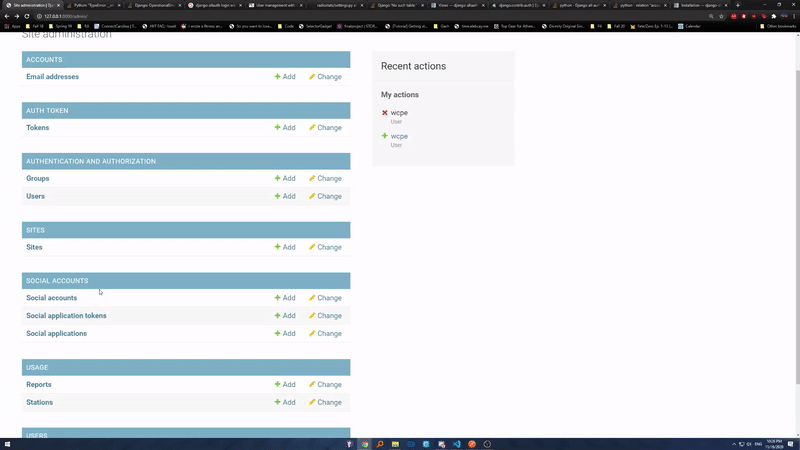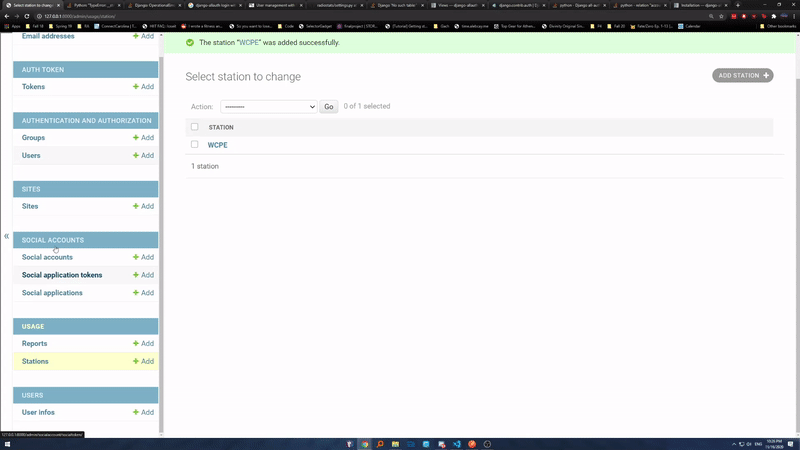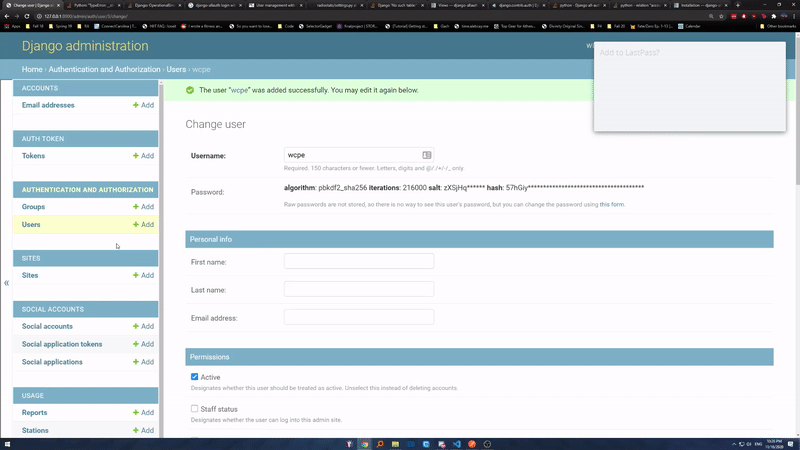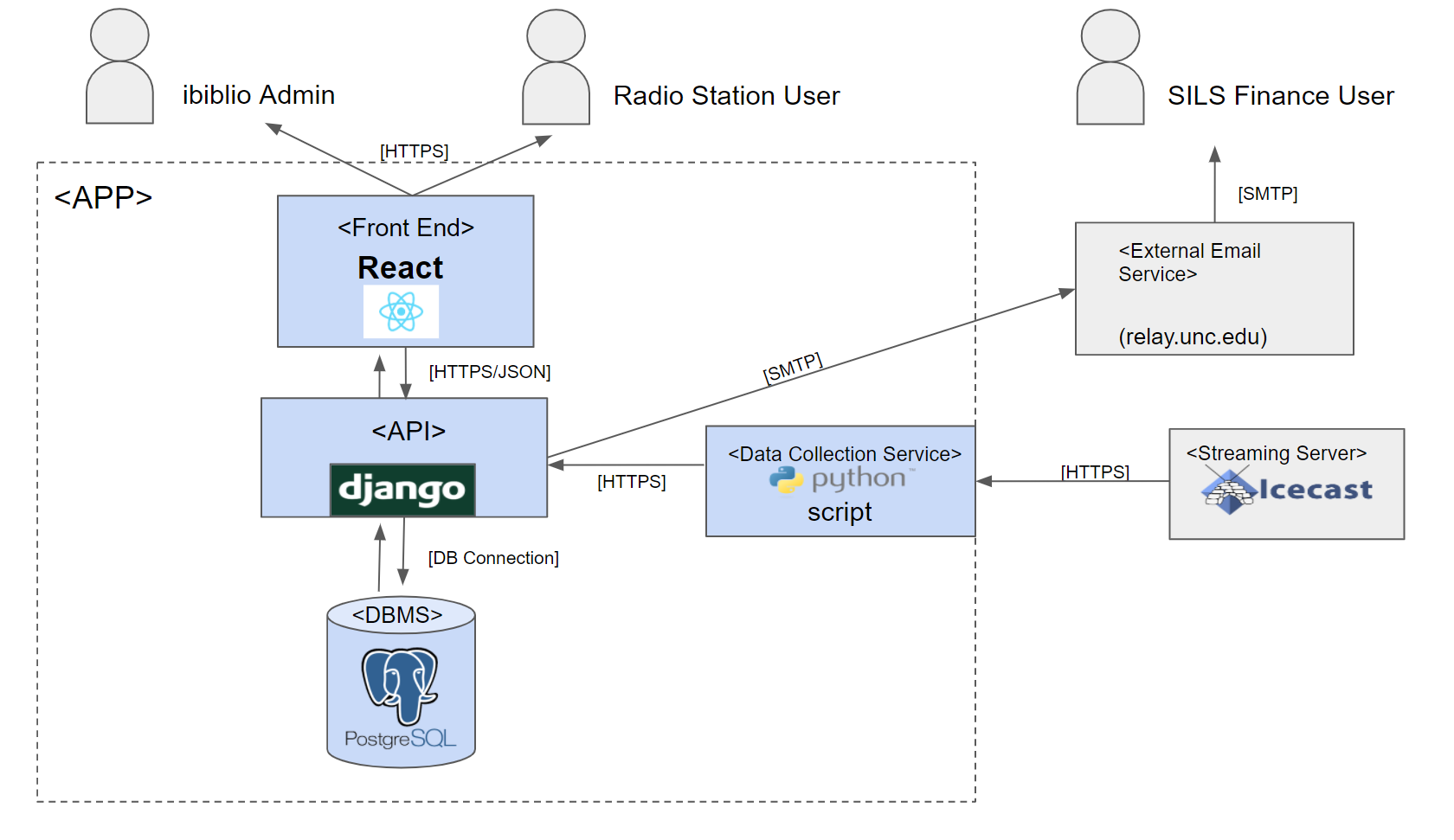ibiblio hosts online streams for radio stations. Our task is to develop a web app that will automate the retrieval of bandwidth and cost data. The web app should show monthly costs and grant permissions to manage/view the data based on user (ibiblio admin, station staff, SILS finance).
Windows
cd \path\to\repository-root
Set-ExecutionPolicy RemoteSigned *may not be necessary
python -m virtualenv .
.\Scripts\activate
pip install -r agent\requirements.txt
pip install -r backend\requirements.txtMac/Linux
cd /path/to/repository-root
virtualenv .
source bin/activate
pip install -r agent/requirements.txt
pip install -r backend/requirements.txtWindows
cd \path\to\repository-root
.\Scripts\activate
copy-item config.dev.yml config.yml
cd .\backend\
python manage.py runserverMac/Linux
cd /path/to/repository-root
source bin/activate
cp config.dev.yml config.yml
cd ./backend
python manage.py runserverWindows
cd \path\to\repository-root
cd .\frontend
npm install
npm run startThe steps below will highlight how to create radio station users in our application. the endpoint to get to admin page is: https://___/backend/admin
- Create the ibiblio admin superuser if one has not been created.
cd \path\to\repository-root
.\Scripts\activate
cd .\backend
python .\manage.py createsuperyou will then be prompted to fill out the username, email, and password for the admin
- Create Station if it does not exist in system
- Create User Profile
- Create UserInfo
Mac/Linux
cd /path/to/repository-root
cd ./frontend
npm install
npm run startWindows
cd \path\to\repository-root
.\Scripts\activate
copy-item config.dev.yml config.yml
cd .\agent\
python start.pyMac/Linux
cd /path/to/repository-root
source bin/activate
cp config.dev.yml config.yml
cd ./agent
python start.pyWarranty:
Last Test: 11/10/2020
Tested by: Caleb Xu
System: Mac OS
Last Test: 11/10/2020
Tested by: Zachary Guan
System: Windows 10
Last Test: 11/10/2020
Tested by: Jonathan Chang
System: Windows 10
The following commands below will manually run the test suite however, any push/pull request to the GitHub repository will automatically run the test suite. This was implemented through Github Actions.
Windows Test
cd \path\to\repository-root
.\Scripts\activate
cd .\backend
python manage.py testWindows Test Coverage
cd \path\to\repository-root
.\Scripts\activate
cd .\backend
coverage run --source='.' .\manage.py test backend.usage backend.users
coverage htmlMac/Linux Test
cd /path/to/backend/
source bin/activate
python manage.py testMac/Linux Test Coverage
cd /path/to/repository-root
source bin/activate
cd ./backend
coverage run --source='.' ./manage.py test backend.usage backend.users
coverage htmlWindows Test
cd \path\to\frontend\
npm run test -- --watchAll=falseWindows Test Coverage
cd \path\to\frontend\
npm test -- --coverage --watchAll=falseMac/Linux Test
cd /path/to/frontend/
npm test -- --watchAll=falseMac/Linux Test
cd /path/to/frontend/
npm test -- --coverage --watchAll=false-
The current production environment lives in a VM hosted by ibiblio.
-
We currently have a locally hosted pre-production environment we use but after our work on the project, we will shut it down.
-
Our project is currently CI/CD enabled through Github Actions
As is the case, copy config.dev.yml to config.yml and adjust the values within it accordingly. OCI images for the frontend,
backend, and agent can then be built with:
docker build . -f deploy/agent/Dockerfile -t ibiblio/radiostats-agent
docker build . -f deploy/backend/Dockerfile -t ibiblio/radiostats-backend
docker build . -f deploy/frontend/Dockerfile -t ibiblio/radiostats-frontendContainers from these images can then be spun up, with directory/file mounts as needed:
docker run -d /path/to/config.yml:/config.yml -v /path/to/mounts.yml:/mounts.yml ibiblio/radiostats-agent
docker run -d /path/to/config.yml:/config.yml ibiblio/radiostats-backend
docker run -d /path/to/config.yml:/config.yml ibiblio/radiostats-frontendThe process of running the containers could also be automated using a tool such as docker-compose, with a snippet along the lines of:
version: "3.8"
services:
backend:
build:
context: .
dockerfile: deploy/backend/Dockerfile
volumes:
- ./config.yml:/config.yml
environment:
- CONFIG_PATH=/config.yml
restart: always
ports:
- 8000:8000
depends_on:
- db
frontend:
build:
context: .
dockerfile: deploy/frontend/Dockerfile
volumes:
- ./config.yml:/config.yml
- ./deploy/frontend/site.template:/etc/nginx/conf.d/site.template
restart: always
ports:
- 3000:3000
agent:
build:
context: .
dockerfile: deploy/agent/Dockerfile
volumes:
- ./config.yml:/config.yml
- ./mounts.yml:/mounts.yml
- ./agent-data:/data
restart: always
db:
image: postgres:alpine
restart: always
volumes:
- ./data:/var/lib/postgresql/data
environment:
- POSTGRES_DB=postgres
- POSTGRES_USER=postgres
- POSTGRES_PASSWORD=mypgpass
- PGDATA=/var/lib/postgresql/data/pgdataThe configuration that would accompany such a setup would resemble:
---
frontend:
host: my.hostname.com
port: 80
tls: false
backend:
debug: false
host: backend
port: 8000
path: '/backend/'
tls: false
secret_key: 'l^k&e20&r754)5zi^8%zbfus66j#ytz@%bu44(fos!&7zgbl1d'
database:
engine: 'postgresql'
# Path is relative to BASE_DIR - see settings.py in backend
name: 'postgres'
user: 'postgres'
password: 'mypgpass'
host: 'db'
port: 5432
agent:
debug: true
dev: true
icecast:
hostname: 'fake.icecast.example.org'
port: 8000
data_file: '/data/response.xml'
stats_url: '/admin/stats'
username: 'my_admin'
password: 'super_secure_password'
request_timeout: 5
cache_ttl: 240
data_dir: '/data'
key: 'ih#{YxFGDk(yRtB9k%jj}gf72rfVR8Nouy4w3n?/geHz.c3num=cbP6V86B(XKDN'
- Django
- Docker
- Python
- React
- PostgreSQL
- Github Actions
The ADR is a pdf at the root of the repository.
-
To contribute to this repository, contact ibiblio staff to gain access to this repository.
-
There are currently no conventions in place for the project
-
To find out more about this project, refer to our website, ibiblio_radiostats
Django Backend App Development
Deployment/Django Backend App Development
React Frontend Development
Copyright (c) [2020] [Zachary Guan, Caleb Xu, Jonathan Chang]
Permission is hereby granted, free of charge, to any person obtaining a copy of this software and associated documentation files (the "Software"), to deal in the Software without restriction, including without limitation the rights to use, copy, modify, merge, publish, distribute, sublicense, and/or sell copies of the Software, and to permit persons to whom the Software is furnished to do so, subject to the following conditions:
The above copyright notice and this permission notice shall be included in all copies or substantial portions of the Software.
THE SOFTWARE IS PROVIDED "AS IS", WITHOUT WARRANTY OF ANY KIND, EXPRESS OR IMPLIED, INCLUDING BUT NOT LIMITED TO THE WARRANTIES OF MERCHANTABILITY, FITNESS FOR A PARTICULAR PURPOSE AND NONINFRINGEMENT. IN NO EVENT SHALL THE AUTHORS OR COPYRIGHT HOLDERS BE LIABLE FOR ANY CLAIM, DAMAGES OR OTHER LIABILITY, WHETHER IN AN ACTION OF CONTRACT, TORT OR OTHERWISE, ARISING FROM, OUT OF OR IN CONNECTION WITH THE SOFTWARE OR THE USE OR OTHER DEALINGS IN THE SOFTWARE.
Special thanks to our mentor John Dinger, our instructor Jeff Terrell, and our amazing clients at ibiblio, Karen and Cristobal.



